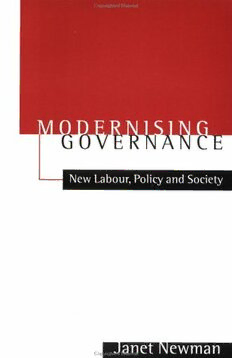Download Modernizing Governance: New Labour, Policy and Society PDF Free - Full Version
Download Modernizing Governance: New Labour, Policy and Society by Professor Janet E Newman in PDF format completely FREE. No registration required, no payment needed. Get instant access to this valuable resource on PDFdrive.to!
About Modernizing Governance: New Labour, Policy and Society
'Janet Newman's 'Modernizing Governance ' provides a comprehensive and thorough critique of contemporary public sector reforms. The book combines an impressive synthesis of theoretical perspectives with a deep understanding of the practice of public policy making and management. The contradictions within a shift to governance are clearly highlighted, and the notion of a third way is carefully deconstructed. This book is an important contribution to the literature, and will provide stimulating reading for academic researchers and students' - George Boyne, Professor of Public Sector Management, Cardiff Business School, Cardiff University 'The tale of Tony Blair and ''government'' is a complicated one which Janet Newman tells with insight and academic rigour….It deserves wide readership; it ought to pique the interest of all those concerned with the condition of British democracy' - David Walker, Analysis Editor and Leader Writer, The Guardian The first comprehensive guide that explores the politics and policies of new Labour. Has Labour's responses to the challenges and issues of the past 4 years, represented something radically different both in content and style from the Thatcher and Major years? Did it, in the language of this book, represent the emergence of a new form of governance in the UK? This book offers: Critical insights into Labour's impact on: § the relationship between government and citizens § public services and their users § the state and civil society Interpretations of core themes in Labour's policy agenda: § the Third Way and social democracy § modernising government § public service reform § joined-up government and partnership § public participation and democratic renewal § remaking civil society Drawing on cultural and institutional theory, the author brings a fresh approach to the study of governance, politics and policy. She traces Labour's attempt to reinstall 'the social' in public and social policy by examining its use of the discourses of democracy, citizenship, community, social inclusion, partnership and public participation. The book analyses the implications of these new, and not so new, discourses for the practice of making and delivering policy, and the patterns of equality and diversity that they invoke. It also highlights the way in which managers, professionals and staff are responding to the new agenda, and the tensions and dilemmas produced in the process of institutional change.
Detailed Information
| Author: | Professor Janet E Newman |
|---|---|
| Publication Year: | 2001 |
| ISBN: | 9781847876607 |
| Pages: | 209 |
| Language: | English |
| File Size: | 0.675 |
| Format: | |
| Price: | FREE |
Safe & Secure Download - No registration required
Why Choose PDFdrive for Your Free Modernizing Governance: New Labour, Policy and Society Download?
- 100% Free: No hidden fees or subscriptions required for one book every day.
- No Registration: Immediate access is available without creating accounts for one book every day.
- Safe and Secure: Clean downloads without malware or viruses
- Multiple Formats: PDF, MOBI, Mpub,... optimized for all devices
- Educational Resource: Supporting knowledge sharing and learning
Frequently Asked Questions
Is it really free to download Modernizing Governance: New Labour, Policy and Society PDF?
Yes, on https://PDFdrive.to you can download Modernizing Governance: New Labour, Policy and Society by Professor Janet E Newman completely free. We don't require any payment, subscription, or registration to access this PDF file. For 3 books every day.
How can I read Modernizing Governance: New Labour, Policy and Society on my mobile device?
After downloading Modernizing Governance: New Labour, Policy and Society PDF, you can open it with any PDF reader app on your phone or tablet. We recommend using Adobe Acrobat Reader, Apple Books, or Google Play Books for the best reading experience.
Is this the full version of Modernizing Governance: New Labour, Policy and Society?
Yes, this is the complete PDF version of Modernizing Governance: New Labour, Policy and Society by Professor Janet E Newman. You will be able to read the entire content as in the printed version without missing any pages.
Is it legal to download Modernizing Governance: New Labour, Policy and Society PDF for free?
https://PDFdrive.to provides links to free educational resources available online. We do not store any files on our servers. Please be aware of copyright laws in your country before downloading.
The materials shared are intended for research, educational, and personal use in accordance with fair use principles.

